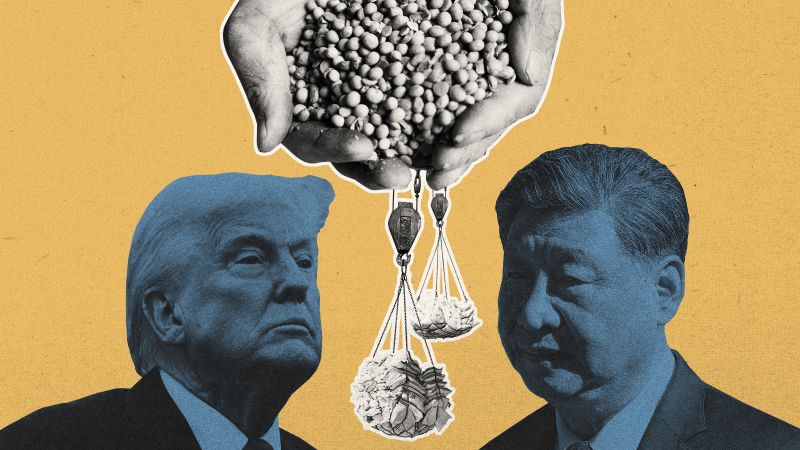Trump's Trade War: Lasting Pain for American Farmers?
Donald Trump's presidency was marked by aggressive trade policies, most notably his initiation of a trade war with China. While the administration touted the strategy as a means to renegotiate unfair trade practices and protect American industries, the impact on American farmers proved to be particularly harsh and long-lasting. This article delves into the consequences of this trade war on the agricultural sector, examining its economic effects and exploring the lasting repercussions felt even today.
The Initial Shockwaves: Tariffs and Retaliation
The trade war, characterized by escalating tariffs on goods exchanged between the US and China, significantly disrupted global trade flows. China, a major importer of American agricultural products like soybeans, retaliated with its own tariffs, effectively shutting out American farmers from a crucial market. This immediate impact led to:
- Plummeting Soybean Prices: Soybean farmers were hit the hardest, experiencing a dramatic drop in prices and export volumes. This resulted in significant financial losses and widespread distress across the agricultural heartland.
- Increased Government Subsidies: The Trump administration responded by implementing a massive bailout program, providing billions of dollars in subsidies to farmers to offset the losses incurred due to the trade war. This, however, was a temporary fix and didn't address the underlying structural problems.
- Uncertainty and Market Volatility: The fluctuating nature of tariffs and retaliatory measures created significant uncertainty in the agricultural markets, making it difficult for farmers to plan for the future and secure financing.
Long-Term Impacts: Beyond the Headlines
The immediate effects of the trade war were undeniable, but the long-term implications continue to ripple through the agricultural sector:
- Shifting Global Market Dynamics: The trade war forced American farmers to seek new export markets, but this proved challenging. China's increased reliance on other soybean suppliers, such as Brazil and Argentina, has altered global market dynamics, making it difficult for US farmers to regain their lost market share.
- Increased Farm Debt: Many farmers took on significant debt to weather the storm, exacerbating existing financial pressures within the sector. This debt burden continues to pose a significant challenge to the long-term viability of many farms.
- Reduced Farmland Values: The decline in profitability led to a decrease in farmland values, impacting not only farmers but also rural communities that rely heavily on agriculture.
The Human Cost: Beyond the Numbers
The economic consequences of the trade war translated into real hardship for American farmers and their families. The stress of declining incomes, mounting debt, and uncertainty about the future led to:
- Increased Farm Stress and Mental Health Issues: The pressures of the trade war contributed to a significant increase in farmer stress, anxiety, and depression, highlighting the human cost of economic disruption.
- Rural Community Decline: The agricultural sector is the backbone of many rural communities. The struggles faced by farmers have had a cascading effect, impacting local businesses, schools, and overall community well-being.
Looking Ahead: Lessons Learned and Future Strategies
The Trump administration's trade war served as a stark reminder of the interconnectedness of global markets and the vulnerability of the American agricultural sector to geopolitical shifts. Moving forward, it is crucial to:
- Diversify Export Markets: Reducing reliance on a single major importer is essential to mitigate future risks.
- Invest in Agricultural Research and Technology: Improving efficiency and productivity can enhance the competitiveness of American farmers in the global marketplace.
- Strengthen Support for Farmers: Providing adequate financial support and mental health resources is vital to ensure the long-term viability of the agricultural sector.
The trade war's impact on American farmers remains a complex and evolving issue. While some argue that the long-term benefits of renegotiated trade agreements outweigh the short-term pain, the lasting economic and social consequences experienced by the agricultural sector are undeniable. This necessitates a careful and thoughtful approach to future trade policies, prioritizing the well-being of American farmers and the stability of rural communities.
Keywords: Trump trade war, China trade war, American farmers, soybean prices, agricultural subsidies, farm debt, rural communities, global trade, trade policy, economic impact, farm stress, mental health, agricultural sector.

